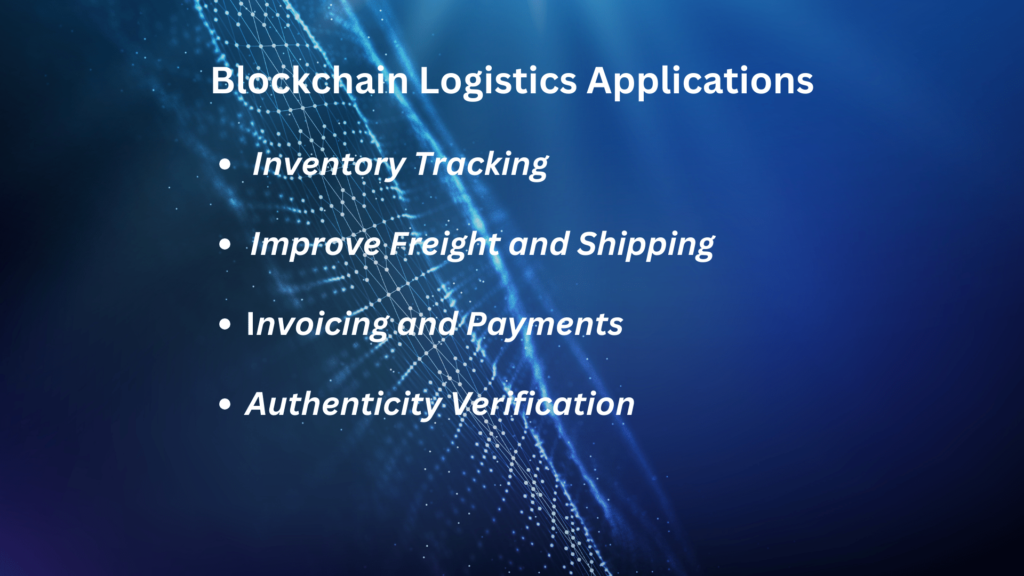In today’s rapidly evolving business landscape, the integration of innovative technologies is imperative for enhancing efficiency and transparency. One such transformative force making waves in the logistics industry is blockchain logistics. This technology can reshape how to provide high levels of security, traceability, and efficiency.
In this article, we’ll explore the transformative impact of blockchain in the logistics industry, examining examples such as DHL’s adoption. Moreover, we’ll uncover the advantages of blockchain cash management and its role in enhancing blockchain shipping logistics. Lastly, we’ll discover how logistics companies use blockchain for the supply chain, highlighting the blockchain logistics applications and overall benefits.
Blockchain in the Logistics Industry
The logistics industry has long grappled with challenges related to transparency, traceability, and security. Enter blockchain, a decentralized and distributed ledger technology that promises to address these pain points. Businesses are increasingly adopting blockchain in the logistics industry to streamline operations and build a stronger, more resilient supply chain. Blockchain can be applied to the industry in various ways, such as:
- Blockchain facilitates tracking and tracing in the supply chain, enhancing visibility and reducing the risks of fraud and counterfeiting.
- Moreover, it also enables the execution of automated smart contracts, streamlining processes like payment and delivery.
- Additionally, blockchain supports secure data sharing among stakeholders, promoting efficient collaboration and optimizing operations, inventory, and demand.
Blockchain in Logistics Examples
The impact of blockchain in logistics is evident through real-world examples:
- Blockchain in logistics DHL is a success story, demonstrating how this technology can revolutionize the global goods movement. DHL Express is testing blockchain to track pharmaceutical shipments, ensuring compliance and safety. Moreover, DHL Global Forwarding, in collaboration with Accenture, uses blockchain to secure pharmaceutical shipments, preventing counterfeiting. Additionally, DHL Supply Chain, partnered with Hewlett Packard Enterprise, uses blockchain to optimize warehouse IoT devices, cutting downtime and costs.
- Maersk, a major global shipping company, partnering with IBM, uses blockchain for efficient global trade documentation. It also reduces paperwork, costs, and delays while enhancing security and transparency.
- FedEx, a top company, joined BiTA to create standards for transportation. Moreover, they’re exploring blockchain to track high-value shipments, ensuring security and traceability.
Blockchain Cash Management & Blockchain Shipping Logistics
Efficient cash management is the lifeblood of any business, and the logistics industry is no exception. Moreover, it extends beyond moving goods to revolutionize blockchain cash management, marking a paradigm shift in financial practices. Furthermore, blockchain benefits cash management by reducing costs, such as transaction and conversion fees, and administrative costs. It boosts speed, enabling near-instant settlements and faster cross-border payments. Additionally, blockchain enhances security, preventing fraud, theft, and hacking through cryptographic measures and consensus mechanisms.
Traditional logistics face delays and inefficiencies in shipping and tracking goods. Enter blockchain shipping logistics, introducing a decentralized and transparent system that boosts the speed and accuracy of shipping processes. This transformative technology addresses longstanding challenges, ushering in a new era of streamlined and effective logistics. Moreover, blockchain provides real-time visibility into goods movement, ensuring stakeholders access current information, reducing delays, and enhancing overall efficiency.
Blockchain Logistics Supply Chain
The supply chain is the backbone of the logistics industry, and blockchain has emerged as a powerful tool for optimizing its operations. Utilizing blockchain in logistics enhances supply chains by enabling tracking, tracing, and automating processes like procurement, production, distribution, and delivery. Through a shared, distributed, and tamper-proof ledger, blockchain records vital information related to products and services. This includes details such as origin, quality, quantity, and price. Moreover, blockchain automates smart contracts based on predefined conditions like orders, payments, or receipts for products and services.
Benefits of Blockchain in Logistics
The benefits of incorporating blockchain in logistics are multifold. Enhanced transparency, traceability, and security are just the tip of the iceberg. The benefits of blockchain in logistics extend to cost reduction, increased efficiency, and improved risk management. The decentralized nature of blockchain ensures that data is secure and tamper-proof, reducing the risk of fraud and errors.
More benefits include enhanced product quality through verifiable and immutable data, ensuring authenticity, and facilitating recalls. Additionally, blockchain increases trust and provides transparent and auditable data to stakeholders, regulators, auditors, and certifiers. This fosters confidence and accountability in the supply chain.
Logistics companies using Blockchain
Many companies are using blockchain to enhance their services and operations such as:
- UPS, a global logistics leader, joined BiTA and partnered with Inxeption, a blockchain-based e-commerce platform, to establish a B2B marketplace. Moreover, this platform enables merchants to create online storefronts, manage inventory, and utilize UPS services, ensuring secure transactions and data.
- IBM Food Trust introduced a blockchain platform connecting various stakeholders in the food supply chain, promoting traceability and provenance. This enhances freshness, quality, and safety while reducing food waste, fraud, and recalls.
- Everledger, a blockchain company, traces high-value assets like diamonds, wine, and art. It employs blockchain to generate digital passports for each asset, containing certification, history, and condition information. These passports are accessible and verifiable by authorized parties such as insurers, customs, and buyers.
Blockchain Logistics Applications
As the technology matures, new and innovative blockchain logistics applications will continue to emerge, further revolutionizing the industry. Blockchain finds application in diverse sectors like food, pharmaceuticals, trade, IoT, shipping, and supply chain. Additionally, integration with technologies like AI, big data, cloud computing, and 5G enhances innovation and effectiveness in the logistics industry.

Inventory Tracking:
Blockchain helps track and manage inventory by providing a shared and verified source of data. Moreover, it uses sensors to give real-time information on things like temperature and quality.
Improve Freight and Shipping:
Blockchain enhances shipping efficiency by tracking shipments and reducing errors. Furthermore, smart contracts automate transactions, saving time and costs without needing middlemen.
Invoicing and Payments:
Blockchain simplifies and secures invoicing and payments. It also enables the use of cryptocurrencies for fast, low-cost payments and automates transactions with smart contracts.
Authenticity Verification:
Blockchain verifies product authenticity by creating digital passports with details on origin and ownership. Also, authorized parties can check this information using blockchain’s features, ensuring traceability and preventing tampering or counterfeiting.
Road Ahead
The road ahead for blockchain in logistics is promising, with ongoing advancements and broader adoption anticipated. Furthermore, advancements in inventory tracking, streamlined shipping, efficient invoicing, and authenticity verification are reshaping the logistics landscape. These advancements are propelling the industry toward a future characterized by increased security, transparency, and efficiency.
In conclusion, the integration of blockchain logistics is a transformative force that promises to reshape the industry. The road ahead promises a future where logistics seamlessly integrates with cutting-edge technologies, ensuring efficiency, transparency, and transformative applications. This evolution guarantees a secure, transparent, and efficient journey for businesses worldwide. Embark on the exciting journey, where innovation is reshaping the industry’s landscape. Join the revolution at the forefront of logistics innovation, where opportunities and success abound. Embrace the future of logistics with us!

